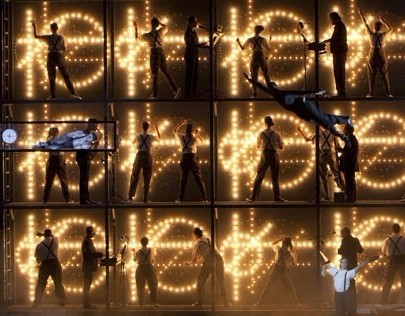Books and Arts; Opera review; Einstein on the beach;
文藝;歌劇評(píng)論;沙灘上的愛(ài)因斯坦;
Breaking the waves; An avant-garde opera on a rare world tour.
乘風(fēng)破浪;一部先鋒歌劇正在進(jìn)行世界巡演,機(jī)會(huì)難得。

THE music of “Einstein on the Beach” is so grand and epic—yet so mesmerising and repetitive—that it feels as if it were the soundscape of a dream. Indeed, much of this odd and wondrous opera, the work of Philip Glass and Robert Wilson, with some transcendent choreography from Lucinda Childs, seems to inhabit a liminal space, eerie and otherworldly. Clocking in at nearly five hours without an interval (viewers can come and go as they please), the production is less a work of entertainment than an experience.
“沙灘上的愛(ài)因斯坦”的音樂(lè)如史詩(shī)般宏偉壯麗——同時(shí)循環(huán)重復(fù),引人入勝——讓人有置身夢(mèng)中之感。這部由菲利普·格拉斯和羅伯特·威爾遜共同創(chuàng)作,經(jīng)露辛達(dá)·蔡爾茲出色編排的奇特而絕妙的歌劇,在很大程度上仿佛令人真的來(lái)到了一個(gè)奇異的超凡的朦朧世界。演出時(shí)間幾乎五個(gè)小時(shí),中間沒(méi)有休息(觀眾可以隨意進(jìn)出)。觀賞這部作品與其說(shuō)是娛樂(lè),倒不如說(shuō)是一種體驗(yàn)。
“Einstein” stunned audiences at the opera’s premiere in Avignon 36 years ago; its narrative-free mesh of music, dance and drama inspired many to feel that they were witnessing something unprecedented. Word of mouth ensured “Einstein” enjoyed a sell-out tour in Europe, and then a hero’s welcome home in New York in late 1976, where the show filled every seat at the Metropolitan Opera. “The avant-garde has become official,” exclaimed a Met producer at the time.
三十六年前,“愛(ài)因斯坦”在阿維尼翁的首演震驚了觀眾;它擺脫敘事的形式,將音樂(lè)、舞蹈和戲劇融為一體,這樣的表演形式讓很多人覺(jué)得自己正在觀看一部前所未有的杰作。有了人們的口口相傳,“愛(ài)因斯坦”在歐洲的巡演場(chǎng)場(chǎng)爆滿。接著在1976年末,“愛(ài)因斯坦”到紐約演出,受到了凱旋英雄般的禮遇,大都會(huì)歌劇院座無(wú)虛席。“這部先鋒歌劇已受到正式認(rèn)可,”當(dāng)時(shí)歌劇院的一位制作人激動(dòng)地說(shuō)。
But the opera’s success did not mean it was profitable. As it happens, few operas make money and “Einstein” is quite a spectacle—even though it is often described as a landmark of minimalism. Its inaugural run may have made Messrs Glass and Wilson famous, but it also left them bankrupt. Not long after their Met triumph, Mr Glass went back to cab-driving in New York, struggling to make ends meet. This ordeal, together with the fact that this opera is uniquely demanding on performers and audience-members alike, has ensured that “Einstein” productions are rare.
但是演出大獲成功不代表這部歌劇有利可圖。事實(shí)證明,很少有歌劇能賺錢,而“愛(ài)因斯塔”正是一個(gè)奇特的典型——盡管它經(jīng)常被形容為“極簡(jiǎn)主義”的里程碑。這部歌劇的首演或許讓格拉斯先生和威爾遜先生聲名大噪,卻也讓他們潦倒破產(chǎn)。在大都會(huì)歌劇院演出取得巨大成功后不久,格拉斯先生回到紐約開(kāi)起了出租車,努力維持日常開(kāi)銷。這種艱苦的生活,再加上這部歌劇對(duì)表演者和觀眾的要求極高,使得“愛(ài)因斯坦”的演出次數(shù)非常少。
So it is impressive that a new production of this unwieldy classic—the first in 20 years—is now making its way around the world, as part of a year-long celebration of Mr Glass’s 75th birthday. After appearances in France, Italy and Britain (where it was performed at the Barbican as part of the London 2012 Festival), its next stop is Toronto’s Sony Centre from June 8th to 10th.
因此令人激動(dòng)的是,這部制作龐大的經(jīng)典之作,將作為格拉斯先生75歲生日為期一年的慶典活動(dòng)的一部分,展開(kāi)新一輪全球巡演,這是二十年來(lái)的第一次。結(jié)束了在法國(guó)、意大利和英國(guó)(在巴比肯作為倫敦2012年奧運(yùn)會(huì)慶典活動(dòng)的一部分進(jìn)行演出)的演出之后,下一站它將在多倫多索尼索尼中心劇院演出,時(shí)間從6月8日到6月10日。
Watching the show now, some of the scripted moments feel a little absurd. And Mr Wilson’s extravagant staging reinforces the opera’s reputation as a money pit. But the two extended dance segments are irrepressibly uplifting. And the meditative music, which is so technically challenging that Mr Glass originally had trouble finding performers for it, washes over listeners, as coolly vast and mysterious as the sea itself.
現(xiàn)在看這部歌劇,一些有臺(tái)詞的場(chǎng)景會(huì)顯得有點(diǎn)突兀。同時(shí)威爾遜先生奢華的舞臺(tái)布景也驗(yàn)證了該劇耗資龐大的名聲不虛。但增加的兩場(chǎng)舞蹈讓人無(wú)法抑制激動(dòng)的心情。還有那冥思的音樂(lè)對(duì)技術(shù)有極大的挑戰(zhàn),一開(kāi)始格拉斯先生為尋找合適的演奏者頗費(fèi)了一番周折。人們聽(tīng)著這音樂(lè),仿佛置身于一片平靜浩瀚而又神秘的大海之中。











